Solved sejpme ii module - Study guides, Class notes & Summaries
Looking for the best study guides, study notes and summaries about Solved sejpme ii module? On this page you'll find 10 study documents about Solved sejpme ii module.
All 10 results
Sort by
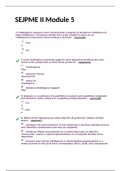
-
SEJPME II Module 5
- Exam (elaborations) • 4 pages • 2020
-
- $10.99
- 2x sold
- + learn more
SEJPME II Module 5 1) Intelligence analysts must communicate a degree of analytical confidence to help intelligence consumers decide how much weight to place on an intelligence assessment when making a decision. [objective84] False True ________________________________________ 2) Joint intelligence planning supports joint operation planning and may result in the production of what three products? [objective102] Contingency Plan ...
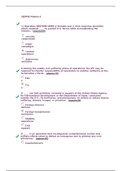
-
SEJPME II Module 6
- Exam (elaborations) • 5 pages • 2020
-
- $10.98
- 1x sold
- + learn more
SEJPME Module 6 1) Operation RESTORE HOPE in Somalia was a crisis response operation which required _____ to protect U.S. forces while accomplishing the mission. [objective104] security cooperation major campaigns combat operations deterrence activities ________________________________________ 2) During the enable civil authority phase of operations, the JFC may be required to transfer responsibility of operations to another autho...
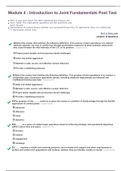
-
SEJPME II Module 4 Introduction to Joint Fundamentals Post Test
- Exam (elaborations) • 5 pages • 2020
-
- $2.99
- 1x sold
- + learn more
1) Select the answer that matches the following definition. This purpose of joint operations is to defend national interests, not only in conflict but through preventative measures to deter potential adversaries who could threaten the vital interests of the U.S. or its partners. [objective72] Project power despite anti-access/area denial challenges Deter and defeat aggression Maintain a safe, secure, and effective nuclear deterrent Provide a stabilizing presence 2) Select the answer that m...
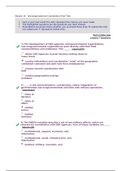
-
SEJPME II Module 14
- Exam (elaborations) • 2 pages • 2020
-
- $2.99
- 1x sold
- + learn more
1) The headquarters of USG agencies, intergovernmental organizations, and nongovernmental organizations work directly with their field representatives and embassies. This _____. [objective222] allows USG agencies to push decision making down to lower levels creates information and coordination "voids" at the geographic combatant command and joint task force headquarters creates smooth coordination with DoD creates geographical overlap pr...
![[Solved] SEJPME II Module 11 Interorganizational Coordination and Multinational Considerations Post Test](/docpics/5f3ee416a4b81_795386.jpg)
-
[Solved] SEJPME II Module 11 Interorganizational Coordination and Multinational Considerations Post Test
- Exam (elaborations) • 2 pages • 2020
-
- $2.99
- 1x sold
- + learn more
1) The Department of Defense conducts interorganizational coordination across a range of joint operations, and is guided by . (Select all that apply.) structures mission partners authorities 2) Which of the following are challenges to effective cooperation between Mission Partners? (Select all that apply.) Different internal organizational structures and supporting C2 systems Differences in policies, processes, and procedures between military and civilian organizations Cooperation may be bas...
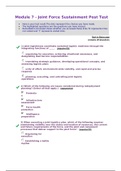
-
SEJPME II Module 7
- Exam (elaborations) • 5 pages • 2020
-
- $3.79
- + learn more
1) Joint logisticians coordinate sustained logistic readiness through the integrating functions of _____. [objective128] organizing for execution, achieving situational awareness, and designating lead Service responsibilities translating strategic guidance, developing operational concepts, and assessing logistic plans unity of effort, environment-wide visibility, and rapid and precise response planning, executing, and controlling joint logi...
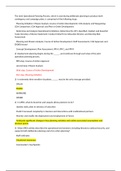
-
SEJPME II Module 8
- Exam (elaborations) • 5 pages • 2020
-
- $7.49
- + learn more
The Joint Operational Planning Process, which is used during deliberate planning to produce both contingency and campaign plans, is comprised of the following steps: Planning Initiation; Mission Analysis; Course of Action Development; COA Analysis and Wargaming; COA Comparison; COA Approval; and Plan or Order Development Determine and Analyze Operational Limitations; Determine the JFC's Specified, Implied, and Essential Tasks; Develop a Mission Statement; Conduct Initial Force Allocation...
![[Solved] SEJPME II Module 2](/docpics/5f3ed7344fc34_795327.jpg)
-
[Solved] SEJPME II Module 2
- Exam (elaborations) • 5 pages • 2020
-
- $7.49
- + learn more
1) The U.S. continues to become more dependent on the global domain within the information environment consisting of the interdependent network of information technology infrastructures, including the Internet, telecommunications networks, computer systems, and embedded processors and controllers. It is imperative that we safeguard this domain known as . [objective51] space networks cyberspace information 2) The document, approved by the President, which delineates the general geographica...
![[Solved] SEJPME II Module 12](/docpics/5f3ee54648615_795393.jpg)
-
[Solved] SEJPME II Module 12
- Exam (elaborations) • 4 pages • 2020
-
- $7.49
- + learn more
Module 12 Lesson 1 Commanders at most operational-level headquarters have observed that CCIRs are developed to support three major activities. One of these major activities is “prioritization of limited resources “the other two are: Commander Decision-making, and understanding the complex environment What characteristics of the complex environment have affected the view of CCIRs.? Globalization, information revolution, interdependence. ALL OF THE ABOVE Lesson 2 Which of the following stat...
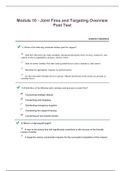
-
SEJPME II Module 10 Joint Fires and Targeting Overview Post Test
- Exam (elaborations) • 3 pages • 2020
-
- $7.49
- + learn more
1) Which of the following statements defines joint fire support? Joint fires that assist air, land, maritime, and special operations forces to move, maneuver, and control territory, populations, airspace, and key waters Joint air and/or artillery fires that assist ground forces to move, maneuver, and control Matching the appropriate response to selected targets Air fires that allow friendly forces to operate without interference from enemy air, ground, or maritime forces 2) Which three ...

Do you wonder why so many students wear nice clothes, have money to spare and enjoy tons of free time? Well, they sell on Stuvia! Imagine your study notes being downloaded a dozen times for $15 each. Every. Single. Day. Discover all about earning on Stuvia


